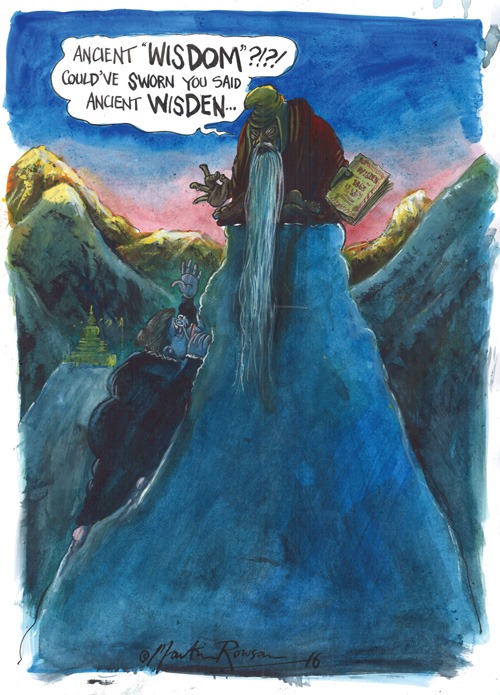
This article is a preview from the Autumn 2016 edition of New Humanist. You can find out more and subscribe here.
Philosophers today hardly talk about wisdom at all. The topic gets merely half a column in the substantial Oxford Companion to Philosophy. We no longer have sages, though we do have the category of intellectuals, more honoured in France than in Britain. If wisdom is the understanding of what it is to be a human being and live a human life, and to include in this understanding a level of knowledge, then the search for it is, in contemporary culture and apart from explicitly religious offerings, largely satisfied in two ways. The first is through literature. I’d suggest that the popularity of fiction, which is if nothing else a portrayal and reflection on human lives, is part of this search for understanding.
The second is what I want to investigate here, prompted by the realisation that the most common epithet for wisdom is “ancient”. Writing on ancient wisdom now comprises a genre of its own. A scan of book titles on the internet turns up a fine array: the Ancient Wisdom of, variously, Bhakti yoga, Chinese tonic herbs, Druids, Bee Masters, Tibet, Vedanta, Numbers, the Chinese, the Celts, the Norse, the Egyptians, Chinese Tea Masters, Atlantis – and if you want to go back even further, the Neanderthals. “The influence of Neanderthal occult wisdom remains strong and can be found throughout history among witches, kabbalists, the Knights Templar, Rosicrucians and even Christianity,” reads the blurb for one – in short, the usual suspects of New Age writings. Honourable mention should also be made of a book from 1965, Wisdom of the Ancients by Tuesday Lobsang Rampa, the pen name of Cyril Henry Hoskin from Devon, who claimed that the spirit of a Tibetan lama had entered his body. It was no handicap that he had never visited Tibet and did not speak Tibetan.
Now the phrase “ancient wisdom” has a history. Until the late nineteenth century it meant a wide reference to Greek, Roman and Biblical authors. Francis Bacon wrote The Wisdom of the Ancients in 1609, with each chapter title taken from Greek and Roman mythology. But the phrase was appropriated by the socialist and former secularist campaigner Annie Besant in 1897 as the title of a work promoting the teachings of Mme Blavatsky. The full title is Ancient Wisdom: an Outline of Theosophical Teachings. The introduction proclaims “the unity underlying all religions”. Besant asserts that there was an “original teaching in the custody of a Brotherhood of great Spiritual Teachers.” She refers to the Sacred Books of the East and claims that, because of their similarities, “it is not unreasonable to refer them to a central primary body of doctrine. To that body we give the name Divine Wisdom, in its Greek form, Theosophy.” She declares that this is the origin and basis of all religions. We might reply that it is unreasonable if there’s no evidence, but let that pass. The book is an anthology of quotations from texts of the worlds’ religions, interspersed with claims like: “China, which is now a fossilised civilisation, was peopled in the old days by the Turanians, the fourth subdivision of the Great Fourth Race, the race which inhabited the lost continent of Atlantis and spread its offshoots over the world.” We can almost admire the assertiveness of this. Blavatsky herself made the absurd claim that sages of the past – Orpheus, Buddha, Pythagoras, Socrates, Confucius – were actually theosophists. A tradition is being invented without any regard for historical truth.
So far, so innocuous. But one of the features of theosophy, and probably one of the main attractions for its adherents, was its opposition to the advance of science and what was viewed as the promotion of a scientific materialism that left no place for things of the spirit. In this respect, and for all its claims to be part of an ancient tradition, theosophy was very much of its time.
A more high-minded attempt to invent a syncretic tradition came in 1946 with the publication of Aldous Huxley’s The Perennial Philosophy, which has always remained in print. Not unlike Besant’s book, it’s an anthology of extracts from the world’s religions and mystics with Huxley’s commentary. The perennial philosophy (a phrase coined by Leibniz) “is the metaphysic that recognised a divine Reality substantial to the world of things and lives and minds; the psychology that finds in the soul something similar to, or even identical with, divine Reality; the ethic that places man’s final end in the knowledge of the immanent and transcendent Ground of all being.” Huxley wrote to Henry Miller that such a doctrine had been “taught by every master of the spiritual life for the last three thousand years – a doctrine of which the modern world has chosen to be ignorant, preferring radios and four-motored bombers and salvation through organisation, with catastrophic consequences that we see all around us.” One can understand a revulsion at bombers in the years around World War II or, indeed, at any time, but one wonders what radios had done to Huxley to be condemned in the same breath.
A more damning criticism of this movement would be simply to deny that all religions are the same. We might add that all religions have a tendency to divide, often quite bitterly, as with the wars of religion in Europe in the seventeenth century, or as with Sunnis and Shias in Islam today. There have been divisions in theosophy too. A second important criticism is that the level at which the different religions are combined is so abstract as to be empty, a grandiloquent rhetoric where words like Being, Reality, Absolute, Transcendent (often with capitals) slide across the page and leave no substantial meaning behind. Many people, in turning to religion, are looking for something specific: symbols, teachings, disciplines, a community.
The phrase “ancient wisdom” is like a box which has had successively more disparate things thrown into it. But both terms are tendentious. Why say “ancient” rather than “old”? Because it sounds more dignified. “Wisdom” is ambiguous as to the epistemological value being given to the teachings offered. The teaching may have been what an “ancient” believed, but that is far from sufficient. In that sense, medical explanations based on the four humours count as ancient wisdom. Modern proponents of the phrase use it to indicate beliefs we should accept now. If we note that “ancient wisdom” = “beliefs held in the past” it sounds a lot less sophisticated.
This indicates a characteristic of the purveyors of ancient wisdom, which is an uncritical attitude to the thinkers of the past. There’s no examination of text or context. The Masters have spoken, and we must listen. The past is employed as a form of authority; it is enlisted as a validation of views in the present. Of course, I don’t mean that there is nothing to be learnt from the past. But if the ideas being promoted have value, can’t they stand on their own feet?
We saw in theosophy and Huxley an aversion to the modern world. This remains an important theme in the modern genre of ancient wisdom. Nature is often the remedy. To take a couple of examples, in Druid Mysteries: Ancient Wisdom for the 21st Century we are told that “druids lived in harmony with the earth and her seasons … today the wisdom and teachings of the druids continue to inspire spiritual seekers across the world.” In Earth Magic: Ancient Shamanic Wisdom for Healing Yourself and Others, and the Planet (a title that is nothing if not ambitious), we are admonished that “we’ve been increasingly removed from truly knowing the earth.” These so-called ancient wisdoms are like postcards from the past, where the sky is always blue. And like postcards, they tell us very little. The problems of the modern world need solutions in the present.

